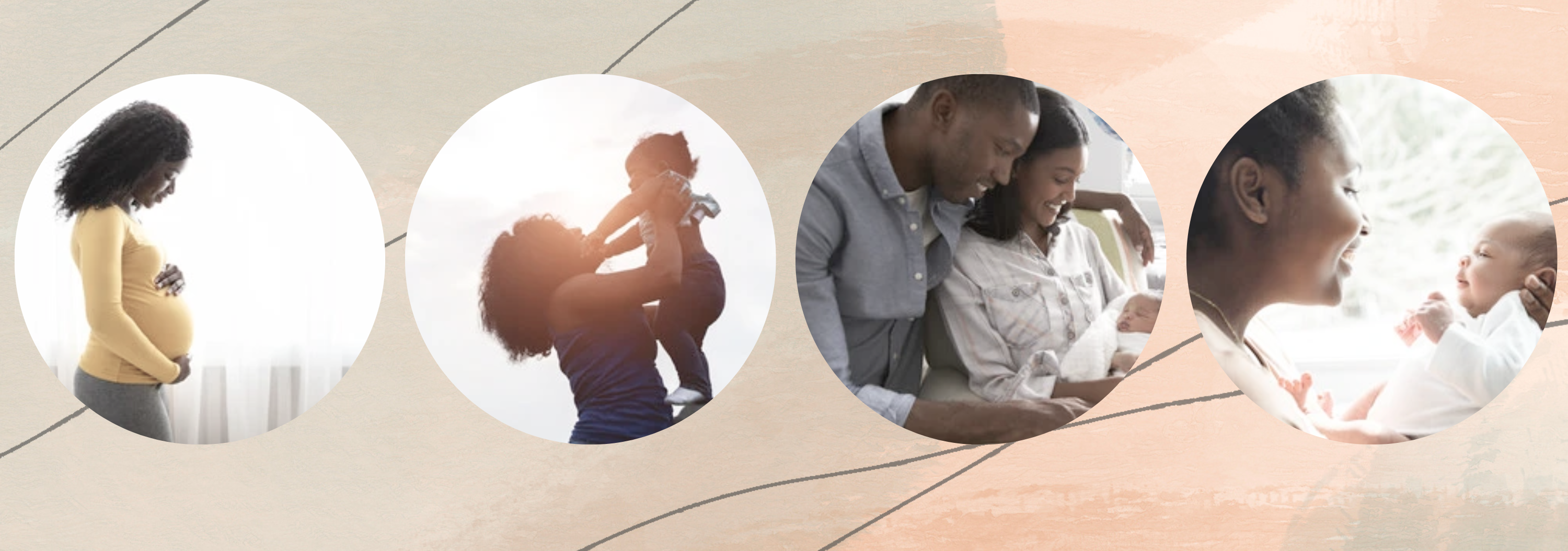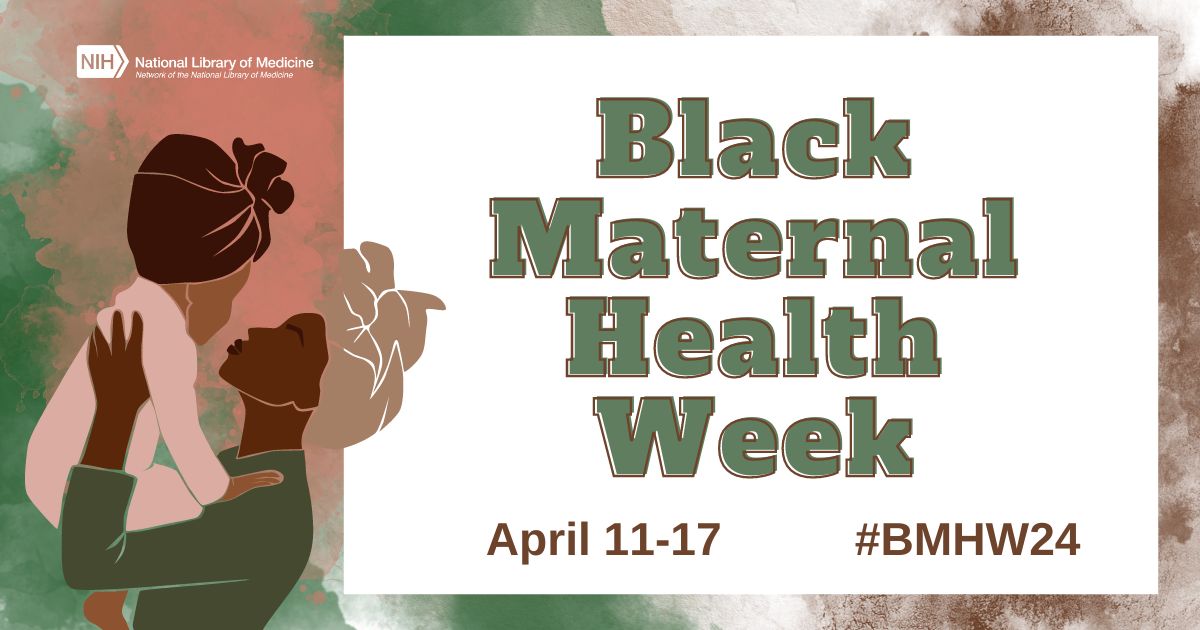

According to the Centers for Disease Control (CDC), “Black Maternal Health Week is recognized each year from April 11 - 17 to bring attention and action in improving Black maternal health. Everyone can play a role in working to prevent pregnancy-related deaths and improving maternal health outcomes.
Each year in the United States, about 700 people die during pregnancy or in the year after. Another 50,000 people each year have unexpected outcomes of labor and delivery with serious short- or long-term health consequences. Every pregnancy-related death is tragic, especially because two in three of them are preventable. Recognizing urgent maternal warning signs and providing timely treatment and quality care can prevent many pregnancy-related deaths…
Black women are three times more likely to die from a pregnancy-related cause than White women. Multiple factors contribute to these disparities, such as variation in quality healthcare, underlying chronic conditions, structural racism, and implicit bias. Social determinants of health prevent many people from racial and ethnic minority groups from having fair opportunities for economic, physical, and emotional health.” - Centers for Disease Control (CDC) (2023)
The Black Maternal Health Webinar Series from NNLM features presentations and discussions from expert guest speakers, and NNLM staff. The presentations will enable librarians and community members to learn more about the past, present and future of Black Maternal Health in America.
Check out these events from April 11-17, 2024
Black Maternal Health Week Playlist
Songs to Uplift and Empower. Songs for the Journey Ahead.
Created by NNLM Staff
National Library of Medicine and National Institutes of Health Resources
MedlinePlus is a service of the National Library of Medicine and links to NIH and other reputable health information sites. The pregnancy topic page provides information to support a healthy pregnancy. The page also provides information on exercise, nutrition, and how to deal with common symptoms like morning sickness, back pain, or discomfort.
Prenatal through Postpartum Resource Handout 
This handout, created by NNLM Region 5 as part of their Birthing Persons Toolkit, contains a wealth of resources for expecting and recent parents. Resources shared includes health information in multiple languages, resources for librarians, and related NNLM webinars.
By the numbers: Health disparities in pregnancy
This article provides statistical information displaying the health disparities in pregnancy. Complied by MedlinePlus Magazine, and online resources from the National Library of Medicine’s MedlinePlus resource.
Better understanding reproductive health issues in Black women 
The National Institutes of Health's All of Us Research Program aims to reflect the rich diversity of our country and help us learn more about how genes, health habits, and the environment intersect and affect our health. This article provides information about how researchers are using data to better understand the reproductive health of Black birthing people.
NNLM Reading Club Black Maternal Health
The NNLM Reading club recommends books on health topics meant for book discussion groups. The Black Maternal Health reading club resource provides links to information about black maternal health issues from NIH, CDC and other resources. Also included are discussion guides for each title along with videos to author interviews about the books.
Other Government Resources
Centers for Disease Control Hear Her Campaign Video
Link navigates to a YouTube video. The CDC’s Hear Her Campaign raises awareness of the pregnancy related complications. Learn more at the CDC’s Hear Her website to learn more about the warning signs that could help save a life and how to support pregnant loved ones. The campaign also has shareable handouts, posters, social media content, and quizzes to increase public knowledge of warning signs for pregnancy-related complications.
White House Maternal Health Blueprint 
Released in June 2022, the White House Blueprint outlines strategies, goals, and initiatives aimed at improving maternal health outcomes across the United States. This includes efforts to reduce maternal mortality rates, address racial disparities in maternal health, improve access to prenatal and postpartum care, and enhance support for maternal mental health, among other objectives.
Centers for Disease Control Pregnancy Mortality Surveillance System
The CDC monitors pregnancy-related deaths nationwide to understand their causes and risk factors. Through the Pregnancy Mortality Surveillance System (PMSS), deaths occurring during pregnancy or within a year post-pregnancy due to pregnancy-related causes are analyzed. Medical experts examine death records, linked birth and fetal death records, and data from all 50 states, New York City, and Washington, DC.
Health Resources & Services Administration Maternal and Infant Mapping Tool 
The Maternal and Infant Health Mapping (MIHM) Tool is an interactive online platform for creating customizable county-level maps on maternal and infant health. It helps users visualize the relationships between health indicators, resources, and demographics to inform decision-making at various levels of governance. Users can investigate the spatial correlations among various maternal and infant health metrics, healthcare facilities, and demographic data.
Culturally and Linguistically Appropriate Services (CLAS) in Maternal Health Care
This is a free e-learning program put out by the US Department of Health and Human Services. Meant for nurses, physicians, and other clinicians, the course provides training in providing care to pregnant people that is responsive to patient values, beliefs and cultures. Modules include an introduction to CLAS maternal health care, self-awareness, providing respectful care that is sensitive to a patient’s culture, preferences, beliefs and values.
Healthy People 2030: Pregnancy and Childbirth 
This site provides information on the Healthy People 2030 objectives and the status of these objectives focused on maternal health. Categories include pregnancy and childbirth in general, drug and alcohol use, family planning and women. The objectives to reduce maternal deaths, increase adequate healthcare for birthing people and reduce serious maternal complications are all getting worse.
Other Organizations
March of Dimes Maternity Care Desert Report
This eye-opening report provides information on maternity care deserts, areas “where there’s a lack of maternity care resources, where there are no hospitals or birth centers offering obstetric care and no obstetric providers.” The report also includes recommendations to Congress for improved maternity care access. The website also features an interactive map charting hospitals, insurance, and obstetrician access throughout the country.
Black Women’s Health Imperative
The Black Women’s Health Imperative delivers evidence-based programming focused on improving health outcomes and promoting health equity for Black women and girls worldwide. Programs include doulas, diabetes prevention and management, reproductive justice, mental health and wellness, and addressing menstrual product insecurity.
National Partnership for Women & Families
This organization provides evidence-based information on pregnancy for pregnant people, advocacy and public policy information and resources to promote economic and health justice for women and birthing people. Their mission is to “To improve the lives of women and families by achieving equality for all women.”
“The Black Mamas Matter Alliance is a national network of Black women-led and Black-led, birth and reproductive justice organizations and multi-disciplinary professionals, working across the full-spectrum of maternal and reproductive health” (Black Mamas Matter Alliance website). The goals of the alliance are to affect changes in policies and put forth policy agendas, promote research, and advocate for Black birthing people.
American Hospital Association Better Health for Mothers and Babies
This toolkit provides links to blogs, podcasts and infographics from American Hospital Association’s Better Health for Mothers and Babies initiative. It highlight hospitals and health systems working to improve maternal and child health outcomes.
Racial Disparities in Maternal and Infant health: Current Status and Efforts to Address Them
This KFF policy brief highlights efforts to address the improvement of maternal health outcomes for people of color resulting from systemic racism and bias in pregnancy and postpartum care.
This organization promotes birth advocacy and birth justice by empowering women and communities to improve maternal and child health outcomes from conception through postpartum.


